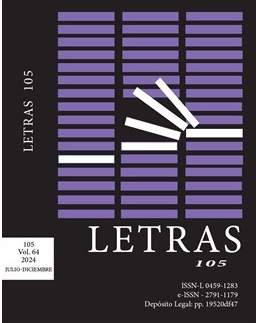The traditional recipes of the indigenous community of Brorán, Costa Rica, as an identity resource
DOI:
https://doi.org/10.56219/letras.v64i105.3281Keywords:
culinary traditions, indigenous community, Brorán, Costa RicaAbstract
Culinary traditions and the lexicon associated with them serve as reflections of a community's worldview, encapsulating the environmental, social, and historical conditions under which a people has evolved. In light of this, this paper examines the nouns most frequently associated with ingredients, recipe names, and culinary techniques within the Brorán indigenous community of Costa Rica, as documented in the Diccionario-recetario pictográfico de la alimentación tradicional en Brörán̈ qu'ercuó (the language of Térraba) (Sánchez et al., 2016). The classification of ingredients follows Eberenz's (2016) categorization into simple foods, prepared foods, cooking utensils, and other relevant items, thereby facilitating the acquisition of the most commonly used vocabulary. Fruits and vegetables emerge as the predominant food sources, a pattern shaped by the community's geographical proximity to both a river and a forest, which restricts the availability of animal-derived ingredients to fish and wild game. Additionally, the Christianization of the Brorán people introduced salt as a fundamental ingredient—an element notably absent in the culinary practices of the Teribe, their sister culture. This study not only highlights the significance of ingredients in shaping culinary identity but also underscores the impact of cultural exchanges and environmental factors on the evolution of the Brorán lexicon
Downloads
References
Barahona, H. (2016). “Ontología formal del léxico de la gastronomía del Valle Central”, en Káñina, Rev. Artes y Letras Vol. XL (Extraordinario), pp. 59-75. https://doi.org/10.15517/rk.v40i4.30226 DOI: https://doi.org/10.15517/rk.v40i4.30226
Cisneros Vargas, N. (2020). Documentación lingüístico-cultural y propuesta de un material multimedia interactivo para la enseñanza del naso de Brorán. Tesis para optar al grado de Maestría en Lingüística. Universidad de Costa Rica.
Constenla, A. (2007). La lengua de Térraba: esbozo fonológico y gramatical, y pequeño diccionario. Editorial UCR. San José Costa Rica.
Eberenz, R. (2016). “De lo crudo a lo cocinado: sobre el léxico fundamental de la culinaria en la historia del español (siglos XIII a XVII). En Revista de Filología Española XCVI, Vol. 96, n° 1, 81-112. Doi: 10.3989/rfe.2016.04 DOI: https://doi.org/10.3989/rfe.2016.04
Espinoza Hernández, M.P. (2016). “El recetario como documento etnográfico. La comida de caza en Extremadura”, en Etnicex: revista de estudios etnográficos, 8, 129-142
Gabb, W. (1875). On the indian tribes and languages of Costa Rica. En Proceedings of the American Philosophical Society, Vol. 14, No. 95
Hinton, L. (2011). “Revitalization of endangered languages”. En The Cambridge Handbook of Endangerment Languages. Cambridge: Cambridge University Press.
Lehrer, A. (1972) “Cooking Vocabularies and the Culinary Triangle of Lévi-Strauss”. En Anthropological Linguistics, Vol. 14, n° 5, pp. 155-171
Sánchez Avendaño, C.; Cabrera Delgado, R.; Cabrera Delgado, M.; Porras Cabrera, M.; Cabrera Zúñiga, P.; Cabrera Ortiz, P.; Nájera Rivera, A.; Rivera Guillén, E.; Navas Rojas, N.; Rivera Villanueva, A.; Nájera Rivera, P.; Villagra Sánchez, I.; Gamarra Rodríguez, F. (2016). Diccionario-recetario pictográfico de la alimentación tradicional en Brörán̈ qu’ercuó (el idioma de Térraba). Universidad de Costa Rica
Sánchez, C. (2013) “Lenguas en peligro en Costa Rica: vitalidad, documentación y descripción”. En Káñina, Rev. Artes y Letras. XXVII (1): 219-250
Sánchez, V. (2006). “Ma(j)e. De la denotación a la apelación”. En Káñina, Rev. Artes y Letras Vol. XXX, n.° 1, pp. 71-81
Torres Oñate, F., Romero Fierro, J., Fernanda Viteri M. (2017). Diversidad gastronómica y su aporte a la identidad cultural. (Diversidad gastronómica y su aporte a la identidad cultural). Revista de Comunicación de la SEECI, 44, 01-13 doi: http://dx.doi.org/10.15198/seeci.2017.44.01-13 DOI: https://doi.org/10.15198/seeci.2017.44.1-13
Vega Falcón, V; Freire Muñoz, D.A.; Guananga Díaz, N.I.; Real Garlobo, E; Alarcón Quinapanta, M.R; Aguilera Martínez, P. (2018). “Gastronomía ecuatoriana y turismo local”. Revista Dilemas Contemporáneos: Educación, Política y Valores, VI-I. https://dilemascontemporaneoseducacionpoliticayvalores.com/index.php/dilemas/article/view/615/1159
Viudas, A. (1982). “El lenguaje técnico de un recetario de cocina”. Anuario de Estudios Filológicos, 5, 219-229.
Published
How to Cite
Issue
Section
License
Copyright (c) 2024 LETRAS (Caracas)

This work is licensed under a Creative Commons Attribution-NonCommercial-ShareAlike 4.0 International License.
Letras magazine retains the patrimonial rights (copyright) of the published works, which favors and allows their reuse under the license (CC BY - NC - SA 4.0), for which they can be copied, used, disseminated, transmitted and expose publicly, as long as the authorship and original source of its publication (magazine, publisher, URL and DOI of the work) is cited, they are not used for commercial or onerous purposes and the existence and specifications of this use license are mentioned.















